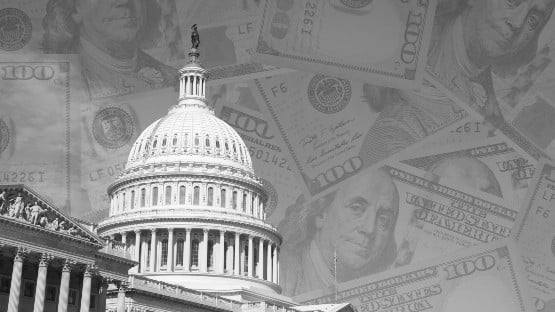
An odd political bedfellows bipartisan coalition voted 314-117 on Wednesday night to pass the Kevin McCarthy-Joe Biden debt-ceiling deal.
House Republicans voted 149-71 in favor of the bill, leaving Democrats to supply the rest of the needed 218-vote majority.
House Dems voted 165-46 to pass the legislation, which now needs approval from the Senate to get to Biden’s desk, and avert a financial catastrophe.
Far-right Republicans played an ugly game of political and economic chicken with the usually non-controversial debt ceiling, using the routine procedural matter to try to extract sweeping budget concessions from Biden and congressional Democrats.
In the end, they gained little of consequence from the weeks of brinksmanship – and McCarthy, who narrowly won election as House Speaker in January amid nonsensical demands from the same far right that pushed this stupid fight, will likely walk away forever politically scarred.
“I came to Washington four years ago to drain the Swamp, not to make it deeper. That’s why I cannot in good conscience vote for a roughly $4 trillion debt increase ‘deal,’ which can only be characterized as a capitulation to the liberal left. I will continue fighting for the people of Virginia’s Sixth District to cut inflation-fueling federal spending, end the trillion-dollar deficits, and reduce spiraling debt that have resulted in untold financial hardship for the American people,” said Sixth District Republican Ben Cline, who actually voted for McCarthy, on 15 ballots, in the Speaker race.
He was joined as a Republican “no” vote by Fifth District Congressman Bob Good, no surprise there, and Ninth District Republican Morgan Griffith, who said he could not “justify voting in favor of legislation that raises the debt ceiling by a projected $4 trillion without a majority of the spending reforms previously agreed to, as was put forth by the Fiscal Responsibility Act.”
Rob Wittman, a Republican who represents Virginia’s First District, voted with the majority to approve the debt-ceiling deal, selling it as “most consequential spending reduction bill in over a decade.”
“The bill reduces the federal deficit by $2.1 trillion over the next ten years, including $240 billion of lower interest payments on the debt. In other words, this is the largest deficit reduction bill in American history,” said Wittman, adding that while “this legislation is not perfect,” it “reflects the reality of a divided government and still delivers for the American people on several fronts.”
Democrats had noted often during what felt like a hostage crisis playing out in front of live TV cameras that Republicans had voted three times, without batting an eye, to raise the debt limit during the Donald Trump presidency, as his four years in the White House saw the national debt rise by $8 trillion, more than a quarter of the debt accumulated in our nation’s history.
Gerry Connolly, a Democrat who represents Virginia’s 11th District, cited that as he explained his “no” vote on the deal.
“President Biden secured the best possible deal under extremely adverse circumstances. It raises the debt ceiling for two years without many of the draconian cuts Republicans demanded. However, I refuse to enable hostage-taking and in the process establish a dangerous precedent. I cannot sign my name to a deal done under duress, and I will not engage in anything that further enables such reckless behavior from my Republican colleagues,” Connolly said.
Fourth District Democrat Jennifer McClellan was a reluctant “yes.”
“Unfortunately, too many Republicans were willing to default without some compromise on spending, despite how catastrophic a default would be for hard working Americans, our economic recovery, and our national security,” said McClellan, adding that “there are provisions in the bill that I do not support; however, this bill is far better for my constituents, the American people, and our economy than the default we would certainly face if it fails.”
“I voted yes on this legislation to protect the best interest of my constituents and ensure America’s continued economic stability. This legislation averts a catastrophic default that would have triggered a recession, cost millions of jobs, devastated retirement accounts and state budgets, and disrupted federal programs and benefits on which countless Americans rely,” McClellan said.
Jennifer Wexton, a Democrat who represents the 10th District, said she voted “yes” for the “imperfect” bill “because, despite what the right-wing majority in the House of Representatives seems to believe, America must pay its bills.”
“I am opposed to the measures imposing restrictions on our bipartisan appropriations process and permitting the Mountain Valley Pipeline, which I fought to strip out. However, this is a necessary compromise that will mitigate the horrific cuts sought by House Republicans and allow us to avert a catastrophic blow to our nation’s full faith and credit,” Wexton said.
Seventh District Abigail Spanberger was on the same page on the deal as McClellan and Wexton.
“I have been very clear — my chief responsibility in this moment is protecting America’s full faith and credit, avoiding a recession, and defending our Commonwealth’s economy,” Spanberger said. “While I do not agree with every provision in this package, I can’t argue with the package’s end result: preventing an economic catastrophe for the Virginians I serve. Such is the nature of compromise in an era of divided government.
“As I’ve long said, we can pay our bills while also having separate conversations about the investments we make in America’s people, communities, economy, and national security. I look forward to the U.S. Senate moving quickly to send this legislation to the President’s desk,” Spanberger said.










